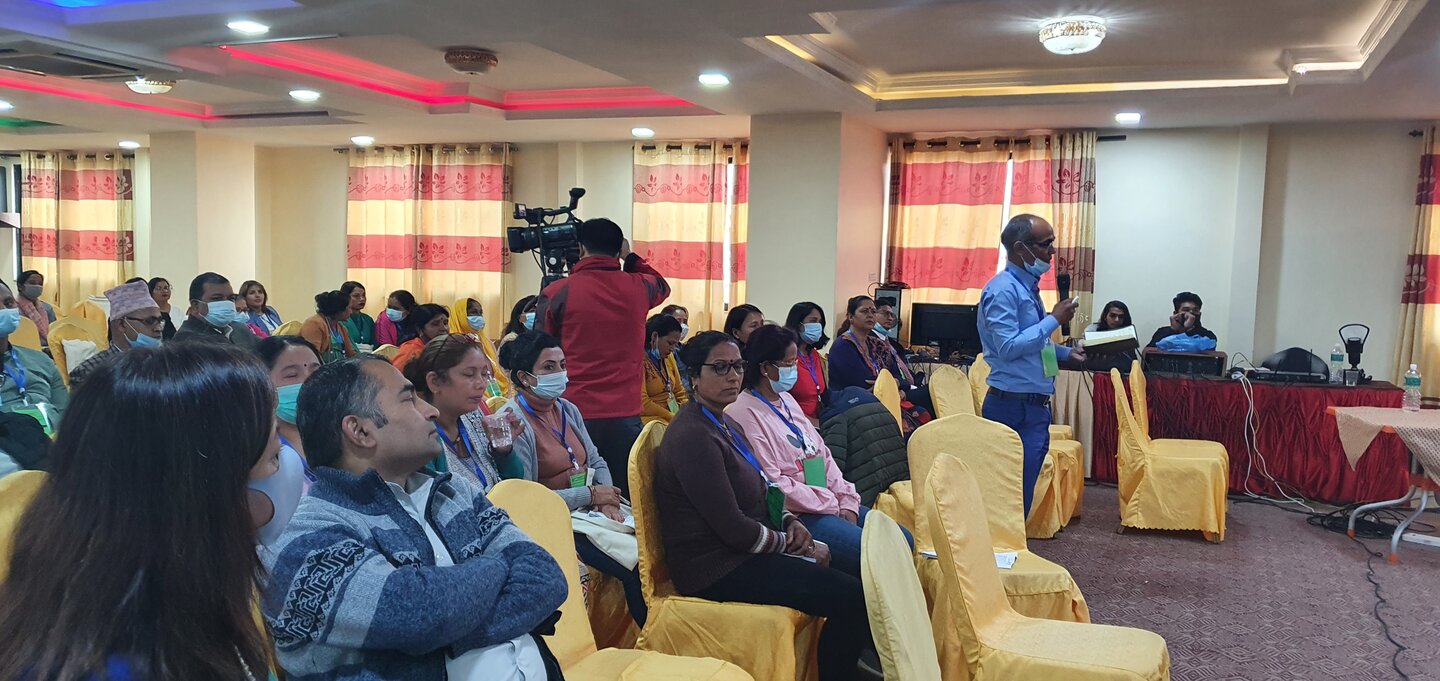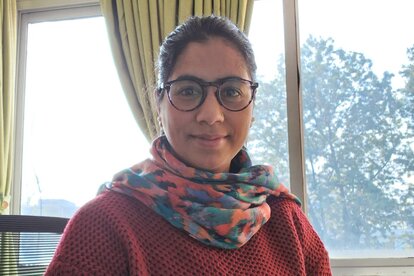The SaMi program is a bilateral initiative between the Government of Nepal and the Government of Switzerland. It is implemented by the Ministry of Labor, Employment and Social Security, and 156 participating LGs in 38 districts of Nepal. Helvetas Nepal provides technical assistance to the program on behalf of the Swiss Agency for Development and Cooperation (SDC). This article is based on a brief internal study conducted by SaMi on the effectiveness of RMNs in Morang and Dhanusha.
Foreign employment was an unpleasant experience for Radhika Karki who flew to Qatar and spent two years more than a decade ago. Although she was promised a job in the cleaning sector, she ended up working as a domestic worker. Radhika’s plans of earning for her family were interrupted when she could no longer bear the unfriendly working conditions and constant bickering from the employers. “There were no fixed working hours, and I had no time to rest,” she said. The children of the household pestered her, along with occasional beatings, she shared. Luckily, she was acquainted with the chairperson of the Returnee Migrants’ Network (RMN), Sunsari, and asked to be rescued. He used his contacts and facilitated to make her return possible.
Radhika now runs a small grocery shop at her home in Sunsari. She is an active member of the RMN and is always open to supporting migrant workers in need. "When I was facing difficulty, the network helped me. Now, I do the same for others,” she said. There are many like Radhika, who were forced to migrate to earn their livelihood and yet ended up in dire conditions abroad. But after their return, they are committed to rendering their support, standing by the side of the workers, and promoting their rights. Their own experiences have made them empathetic towards the condition of the migrant workers and are willing to work for their protection.
The Safer Migration (SaMi) Programme started promoting such networks in 2013 realizing that they could play a significant role in making people aware in many respects of migration, and lobby with the governments and relevant stakeholders on their own. The program supported formalizing and strengthening the networks which consisted of returnees and a few members of the migrant households who had already gathered with the common motive of working for migrant workers. The program initially supported the networks in Sarlahi. In their decade-long journey, the networks have been promoting migrant workers’ rights and mainstreaming their issues into the political agenda at all levels of the government.
During the implementation of its second phase, SaMi extended support to the networks in eight working districts – Khotang, Ramechhap, Dhanusha, Saptari, Nawalparasi, Sunsari, Dhading, and Kailali. By 2022, the RMNs had their footprints in 37 districts, where they are functional and contributing to safer migration initiatives in one way or the other.
SaMi provides technical support to define the objectives, structures, and strategies of those networks. The program also supports building the capacities of the network members by orienting them about foreign employment, relevant policies and regulations, available support mechanisms, and possible coordination and collaboration with the relevant stakeholders, including Migrant Resource Centers (MRCs).
Activities of RMNs
The network members have a key role in raising awareness about migration-related services. They inform people about ways to migrate safely and make the families aware of the available support services in case of injuries and deaths of migrant workers as well as facilitate receiving such services. The members closely coordinate with the MRCs, established by local governments as part of the SaMi program for information dissemination and coordination of migration-related services. "When my son-in-law died in Saudi Arabia about five years ago, a network member helped me to get the necessary documents from abroad and took me to the MRC for financial assistance,” said Malati Devi Mahara, a beneficiary from Laxmaniya Rural Municipality, Dhanusha. “The MRC then facilitated receiving 21 lakh rupees [16,531 USD approximately] from the Foreign Employment Board and insurance company,” she added.
They link migrant workers and their families with the SaMi’s pre-departure vocational skills training, financial literacy classes, and psychosocial counseling sessions. Generally, the RMNs refer cases related to cheating, deaths, and those requiring financial assistance to the MRCs. They also engage with the Chief District Officers (CDOs), police, and relevant stakeholders, as necessary, to facilitate migrant workers’ access to justice.
The network members also make use of social media platforms to trace the missing migrants or to reach out to their families. For instance, J.P. Sinha, the chairperson of the district network, Saptari, and provincial network of Madhesh Province, frequently updates his Facebook page providing information on migrant workers. Purna Pokhrel, another network member of Sarlahi, utilizes social media to exchange migration-related information with fellow network members. “We have created a common group on Facebook and WhatsApp and added the network members of other districts,” she said. They shared their experiences, and information and referred the relevant cases to one another through the group. The RMNs play a critical role in facilitating cases without proper documentation or evidence. They also sensitize people about social stigmas faced by migrants and left-behind family members, especially the wives, and link them to support services like psychosocial counseling.

In some districts where the networks are active and strong, they occasionally submit attention letters to the relevant government authorities such as the CDOs for their necessary support and facilitation in migration-related issues. Some of the local-level RMNs have also established cooperatives at the local level. The returnee migrants and the individuals from migrant households become members of such cooperatives where they save money as well as take loans when necessary. "We are working to establish cooperatives in all 25 wards of the Sub-metropolitan City," said Dhukharan Yadav, the chairperson of the RMN, Dhanusha.
The COVID-19 pandemic caused obstacles for the networks to carry out many planned activities and delayed their expansion at the local level. But now, they are proactively participating and contributing to the regular interactions, coordination, and collaboration with the LGs.
Sustaining the networks
The focus of the SaMi program now is on institutionalizing migration services within the government system and making the RMNs functional is crucial for the sustainability of such services.
SaMi, whenever possible, links the networks to the policy discussions and programs at the federal and provincial levels. SaMi facilitated the participation of a few RMN members across SaMi working areas during the National Conference of Returnee Migrants held in Kathmandu from October 28 to 29, 2021. SaMi also facilitated the representation of RMN members who returned from Qatar to share their concerns and experiences during a consultative meeting organized by the Ministry of Labor, Employment and Social Security (MoLESS) in November 2021. The consultation aimed at seeking the experiences, and recommendations of migrant workers for the improvement on bilateral labor migration agreement signed with Qatar in 2005.
This way, they are exposed to the pertinent discussions surrounding migration and can utilize these connections to expand their networks as well as access support mechanisms for migrant workers. Such initiatives will also eventually prepare the networks to operate and continue their regular activities and play a role as a catalyst for continuing migration-related services in the longer term. For now, they face challenges in generating resources to bear the operational costs of the network. “We will lobby with the provincial and local governments for necessary budget allocation to sustain the network and its activities,” said Lekhnath Khatiwada, the chairperson of the provincial RMN network, Koshi Province.
Networks have also started extending membership by taking a nominal fee to help generate resources for their daily operations. Similarly, they are in the process of establishing saving and credit cooperatives to address the issues of resources and membership. They are taking examples of the cooperatives in Dhanusha, and gradually replicating in other districts to generate additional resources which could lead to the financial sustainability of such networks.








